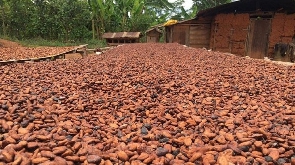Ghana’s banks are pushing the government for better terms in restructuring their cocoa debt holdings, as part of negotiations where success is important for goals set for the country by the International Monetary Fund.
The government is offering a 12% rate on five new bonds maturing in 2025 through 2029, according to three people familiar with the matter. These would replace cocoa bills paying an average of 30%, a cut the banks consider too sharp since it would wipe out around 40% of face value, they said. The bills are used to finance Ghana’s production of cocoa, of which it’s a major world supplier.
Instead, the lenders want to get similar terms to a domestic debt exchange that closed in February, where the maximum cut in the rate lenders suffered was 10.7 percentage points.
Ghana, which defaulted on a eurobond payment earlier this year, is restructuring most of its debt to make it sustainable under a $3 billion IMF program which was approved in May. The Fund’s backing is based on the results of the February debt exchange and after bilateral creditors under the Group of 20’s Common Framework gave the nation financing assurance.
Even though the cocoa obligations don’t form part of public debt because they are owed by the state-owned Ghana Cocoa Board, reorganizing them is in line with IMF’s demand to reduce the institution’s debt and strengthen its balance sheet.
The current exercise could affect up to 7.9 billion cedis ($695 million) of debt, one of the people said. Interest will be paid semi-annually but 5% of the principal will be paid in 2025, 20% in 2026, and 25% each in the rest of the three years.
A spokeswoman for the Finance Ministry didn’t respond to a text message seeking comment. John Awuah, chief executive officer of the Ghana Association of Banks, also didn’t respond to a text message or telephone calls seeking comment.
In the February deal, investors exchanged 87.8 billion cedis in obligations for new securities that paid as little as 8.35%, versus an average of 19% on the old notes.
While Ghana received an immediate disbursement of $600 million from the IMF following the approval of the program, further payouts depend on Ghana meeting performance targets, including reaching debt restructuring agreements with investors.
In addition to cocoa bill negotiations, the country is still in talks with local pension funds to revamp their 29 billion-cedi investments in government securities. And it’s close to a deal with lenders on $975.7 million of outstanding domestic dollar bonds.
Banks will likely accept the offer on domestic dollar bonds because of the narrow drop in coupon proposed, two of the people said.
The government is proposing two new bonds maturing in June 2027 and June 2028, paying a 2.75% coupon and 3.25% coupon respectively, compared with an average of 6% on existing securities, the people said.
Ghana is racing to restructure domestic debt against the backdrop of a self-imposed deadline of September to conclude negotiations with eurobond investors.
A timely debt restructuring agreement with creditors is essential for Ghana to secure the expected benefits of its IMF program, Stéphane Roudet, the IMF’s mission chief, said last month.
Business News of Saturday, 8 July 2023
Source: Bloomberg

















